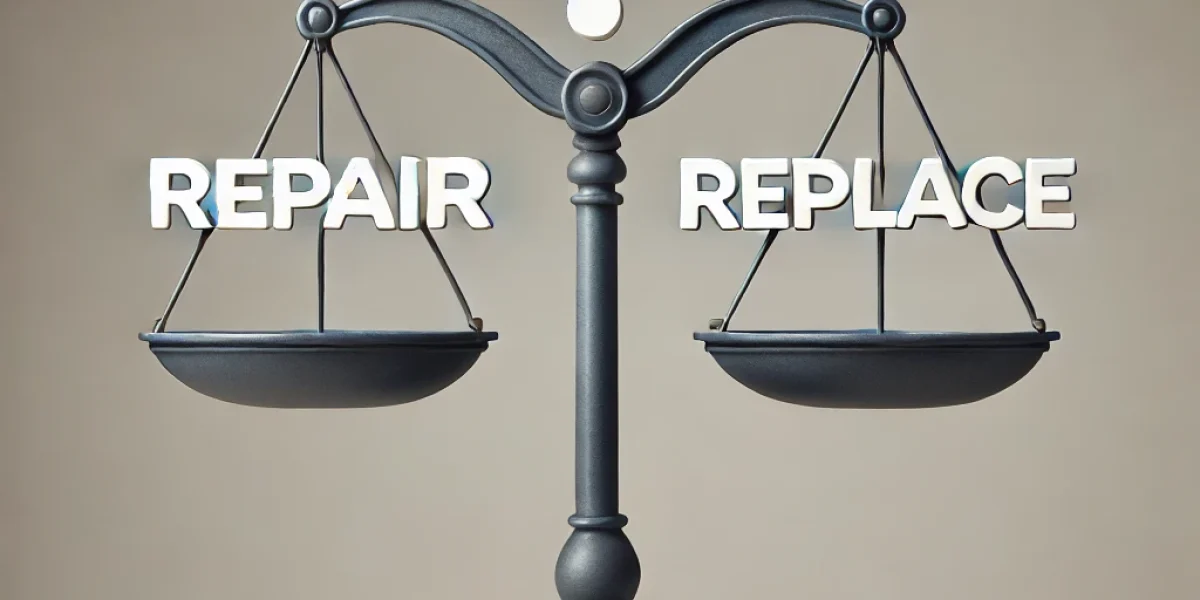Homeowners often face a tough decision: should they repair a broken appliance or replace it with a new one? To avoid unnecessary expenses and make the right choice, it’s important to consider several factors. In this article, we’ll discuss when repairs make sense and when investing in a new appliance is the better option.
When Should You Repair Your Appliance?
Repairs are a smart choice in the following cases:
- The appliance hasn’t reached the end of its lifespan yet. If your unit is less than 5-7 years old, repairing it is usually worth it, as most components are still in good condition.
- The problem is minor and easy to fix. Replacing a refrigerator door seal, an oven thermostat, or a washing machine pump costs significantly less than purchasing a new appliance.
- The repair cost is less than 50% of a new appliance’s price. If the repair is inexpensive compared to buying a new unit, fixing it is the logical choice.
- The appliance is high-end or premium. If you own a top-tier or built-in appliance, repair is often a better investment because replacing it would be much more expensive.
- It is still under warranty. If your appliance is covered by a manufacturer’s or extended warranty, you may be eligible for a free repair.
When Should You Replace Your Appliance?
Sometimes, replacing an appliance is the best decision, especially if:
- The appliance has reached its expected lifespan. For example:
- Refrigerators and freezers last 10-15 years;
- Washing machines and dryers last 8-12 years;
- Ovens and stoves last 12-20 years;
- Microwaves last 7-10 years. If your appliance is old, it may be less efficient, consume more energy, and break down frequently.
- The repair cost is too high. If fixing the appliance costs more than 50% of a new unit, replacing it is the better option.
- Parts are discontinued or too expensive. Older models may require rare or overpriced replacement parts.
- The same issue keeps happening. If your appliance has been repaired multiple times and still malfunctions, it’s time to consider a new one.
- Newer models are more energy-efficient. Upgrading to a modern appliance can reduce your electricity bills significantly.
Appliance-Specific Repair vs. Replacement Recommendations
Refrigerators & Freezers
- Repair if: The issue involves a relay, thermostat, fan, or door seal replacement.
- Replace if: The compressor fails after 10+ years.
Washing Machines & Dryers
- Repair if: The pump, belt, or door seal needs replacement.
- Replace if: The drum or motor fails in an older unit.
Ovens & Microwaves
- Repair if: The thermostat, heating element, or glass door needs fixing.
- Replace if: The control panel is broken or the unit is outdated.
Range Hoods
- Repair if: The motor, filters, or lights need replacement.
- Replace if: The entire hood is damaged or beyond repair.
Checklist: Repair or Replace?
✅ Repair if:
- The appliance is less than 5-7 years old.
- The issue is minor.
- The repair cost is less than 50% of a new unit.
- The unit is premium or high-end.
❌ Replace if:
- The appliance is 10+ years old.
- The repair is costly.
- The issue is recurring.
- Parts are unavailable or expensive.
- A new unit will save energy costs.
Conclusion
If your appliance breaks down, don’t rush to replace it. In many cases, repairs are more cost-effective than buying a new unit. However, if the problem is severe and the appliance is outdated, investing in a new model might be the smarter choice. Before deciding, consult with a professional technician. At Fix Up Pro, we provide expert repair services in Winnipeg, Lorette, Oak Bank, Landmark, and Ste Anne. Our specialists can help you determine whether to repair or replace your appliance!
